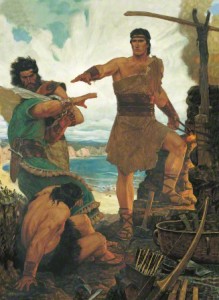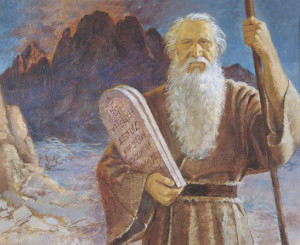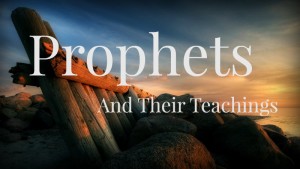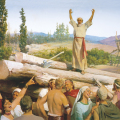Following are sample passages from 1 Nephi 17. On the surface, this chapter is about Nephi being commanded to build a boat. His brothers don’t want to help so Nephi reads them the riot act then the Lord shocks the two brothers to demonstrate His power.
That is the surface story. But underneath this tale is a wealth of doctrine (golden nuggets if you will) about the nature of God, His laws, faith, the Lord’s universal love and treatment of humanity, and more. All verses in this post come from 1 Nephi 17.
In last week’s post the first four golden nuggets were discussed. The last three are a little longer so I have put them in their own post. There are powerful lessons to be found in Nephi’s writings.
-
All things are done by God’s word
 Nephi is trying to make the point to his brothers that God is not only a man of His word, but that all things are done according to divine decree. Without a decree of some sort, nothing is done. God’s word is the governing force in the universe. Nephi uses the Israelite’s bondage in the days of their Egyptian captivity as an example. Moses was commanded to bring them out of bondage. Every step of the way Moses was given instructions on what the Lord wanted him to do next. All of the miracles performed by Moses were done according to the word of the Lord to Moses. Moses was not just let loose to do whatever he wanted, everything he did was because he had received divine direction to do it. Here are verses 25 – 31:
Nephi is trying to make the point to his brothers that God is not only a man of His word, but that all things are done according to divine decree. Without a decree of some sort, nothing is done. God’s word is the governing force in the universe. Nephi uses the Israelite’s bondage in the days of their Egyptian captivity as an example. Moses was commanded to bring them out of bondage. Every step of the way Moses was given instructions on what the Lord wanted him to do next. All of the miracles performed by Moses were done according to the word of the Lord to Moses. Moses was not just let loose to do whatever he wanted, everything he did was because he had received divine direction to do it. Here are verses 25 – 31:
25. Now ye know that the children of Israel were in bondage; and ye know that they were laden with tasks, which were grievous to be borne; wherefore, ye know that it must needs be a good thing for them, that they should be brought out of bondage.
26. Now ye know that Moses was commanded of the Lord to do that great work; and ye know that by his word the waters of the Red Sea were divided hither and thither, and they passed through on dry ground.
27. But ye know that the Egyptians were drowned in the Red Sea, who were the armies of Pharaoh.
28. And ye also know that they were fed with manna in the wilderness.
29. Yea, and ye also know that Moses, by his word according to the power of God which was in him, smote the rock, and there came forth water, that the children of Israel might quench their thirst.
30. And notwithstanding they being led, the Lord their God, their Redeemer, going before them, leading them by day and giving light unto them by night, and doing all things for them which were expedient for man to receive, they hardened their hearts and blinded their minds, and reviled against Moses and against the true and living God.
31. And it came to pass that according to his word he did destroy them; and according to his word he did lead them; and according to his word he did do all things for them; and there was not any thing done save it were by his word.
These last two verses demonstrate how fickle man is. Even though God was doing everything for the Israelites required to sustain life and prosper, even in the wilderness of Sinai, they turned their hearts away from Him and desired, instead the gods of Egypt and the ways of Egypt. It was their stubbornness and unwillingness to believe and worship the God of Israel that caused all their heartache.
The important thing to note here is that the Lord was never random in his treatment of his people. He always lives up to the rule that all things are done according to His word. He would explain the covenants and requirements for happiness to the people. It was up to them to accept His word on faith and live up to their privileges, and hence receive the promised blessings, or reject that same word and receive the punishments and misery that comes with being disobedient to the laws of God. It was always their choice to choose happiness or misery. It is always our choice as well.
-
God’s love is universal
Sometimes people are confused as to why it was okay for the Israelites to slaughter with such abandon the people whose land they took when they moved into the promised land. Verses 32 – 38 explains the principle. Note that there are universal standards of wickedness. It is only when a nation has become “ripe” in iniquity that the Lord destroys them.
To be ripe in iniquity means that the people have passed the ability to repent. At this point in their lives they have so given themselves to Satan that nothing can save them. The Spirit of God has ceased to strive with them. In other words, the Spirit has declared their souls completely beyond the redemptive power of Christ. The people now belong lock, stock, and barrel to Satan. Until they reach this point, the Lord always tries to save them. This includes people outside of the covenant, as well as those inside the covenant.
In the Church we sometimes think that the Lord only works to save us, and if someone is not willing to make the covenants of baptism then they are completely lost. Not so. There are those who won’t receive the gospel in this life, but it has been foreordained that they would have the gospel preached to them in the spirit world. The Lord still tries to save them from the clutches of Satan in this life, even if the gospel isn’t going to be preached to them in this life.
These verses make the point that the Lord does not destroy any nation until they have completely ripened in iniquity. Often he uses the wicked to destroy those who are ripe in iniquity. In this case He sent in His covenant people to do it. Killing was not counted a sin to the people of Israel because they were commanded by God to do it. This reminds us that whatever God commands is right and just, even if in different circumstances it would be considered wrong. Nephi killing Laban is another example of killing that was sanctioned by God. It was done by His commandment.
32. And after they had crossed the river Jordan he did make them mighty unto the driving out of the children of the land, yea, unto the scattering them to destruction.
33. And now, do ye suppose that the children of this land, who were in the land of promise, who were driven out by our fathers, do ye suppose that they were righteous? Behold, I say unto you, Nay.
34. Do ye suppose that our fathers would have been more choice than they if they had been righteous? I say unto you, Nay.
35. Behold, the Lord esteemeth all flesh in one; he that is righteous is favored of God. But behold, this people had rejected every word of God, and they were ripe in iniquity; and the fulness of the wrath of God was upon them; and the Lord did curse the land against them, and bless it unto our fathers; yea, he did curse it against them unto their destruction, and he did bless it unto our fathers unto their obtaining power over it.
36. Behold, the Lord hath created the earth that it should be inhabited; and he hath created his children that they should possess it.
37. And he raiseth up a righteous nation, and destroyeth the nations of the wicked.
38. And he leadeth away the righteous into precious lands, and the wicked he destroyeth, and curseth the land unto them for their sakes.
Verse 34 makes the point that it is not just the bloodline that makes a person “chosen.” If the people Israel went in to kill had been righteous they would have been just as precious in the sight of God as those of the house of Israel. In verse 35 the Lord’s position is clarified with this statement, “he that is righteous is favored of God.” It really is as simple as that.
Our ability to stay upon the land given to us by God, wherever that is on earth, depends on our righteousness. As long as we are living up to the standards of our society and will listen to our God-given conscience, the Lord will bless us as a people. It is only when we reject whatever light the Lord has blessed us with that we ripen in iniquity. At that point the Lord promises every nation that they will be removed from where they are and their land, their place, will be given to someone more deserving.
The Americas is the only place that is held to the highest standard. Since He has declared the western hemisphere to be the choicest lands, He also requires that those who live here must serve Him, the one true God, or plan on being swept from the earth once they become fully ripe in their iniquity.
-
Faith to do great things can be simple
Most of the following verses you have already read, but I have combined them with additional verses to make a point. Nephi’s faith was based on a broad view of God’s power and ability. He fully believed that God could do anything he chose to do. He also had learned from his own experience that if he was commanded by the Lord to do something, and he applied himself to the task with complete trust in the Lord, that miracles could and probably would happen.
A miracle is just an event we can’t explain. Nephi understood that they weren’t miracles to the Lord, only to him, Nephi. The Lord understands it all. So trusting in the Lord’s tender mercies and guidance, Nephi applied himself to every assignment with complete abandon, i.e., with no doubts in his heart. He allowed himself to believe completely in the Lord’s willingness to bless him because he was trying so hard to be obedient and not falter in his duty to his God.
 As you read these verses think about what Nephi is saying from his point of view. He is only rehearsing to his brothers basic teachings that they were all raised with. They all understood and knew the stories of God’s miracles with Moses and the children of Israel. They were taught that these things were facts, and that God did these things for them as a nation because they were a chosen people by God. They should expect to have such things happen for them.
As you read these verses think about what Nephi is saying from his point of view. He is only rehearsing to his brothers basic teachings that they were all raised with. They all understood and knew the stories of God’s miracles with Moses and the children of Israel. They were taught that these things were facts, and that God did these things for them as a nation because they were a chosen people by God. They should expect to have such things happen for them.
26. Now ye know that Moses was commanded of the Lord to do that great work; and ye know that by his word the waters of the Red Sea were divided hither and thither, and they passed through on dry ground.
27. But ye know that the Egyptians were drowned in the Red Sea, who were the armies of Pharaoh.
28. And ye also know that they were fed with manna in the wilderness.
29. Yea, and ye also know that Moses, by his word according to the power of God which was in him, smote the rock, and there came forth water, that the children of Israel might quench their thirst.
46. And ye also know that by the power of his almighty word he can cause the earth that it shall pass away; yea, and ye know that by his word he can cause the rough places to be made smooth, and smooth places shall be broken up. O, then, why is it, that ye can be so hard in your hearts?
50. And I said unto them: If God had commanded me to do all things I could do them. If he should command me that I should say unto this water, be thou earth, it should be earth; and if I should say it, it would be done.
51. And now, if the Lord has such great power, and has wrought so many miracles among the children of men, how is it that he cannot instruct me, that I should build a ship?
This is what, by today’s standards would be called a “Duh!” moment. If God has so much power that anyone He commands to do something has to but say it and it is done, even if it means turning earth into water, or moving a mountain, or hitting a rock and having water gush forth to quench the thirst of millions, then why can’t God tell me to go build a ship? Which of these miracles is more difficult?
Final Thoughts on Nephi
When we think of Lehi and Nephi’s journey to the promised land we often just think of the trials and hardships they faced, but as you read Nephi’s words, I hope you notice that for the most part he is full of hope and he rejoices in the loving mercies of God for His children. Nephi is a recipient of those loving mercies because he chose to obey and trust the Lord in all things.

To read more of Kelly Merrill’s articles, click here.
Because he chose to be obedient and to trust the word of the Lord, without reservation, miracles became common events in his life. He grew to expect the Lord to do whatever was needed to complete the work He had commanded be done, once Nephi had done all he could to do his own part. This is the faith we should all be emulating. The Lord really is a God of miracles, miracles just being events we don’t have any way to explain. We don’t know how rainbows work or the winds work, but we don’t fight them. We accept them and are grateful for them. We need to learn to accept God’s blessings the same way, with gratitude and thanksgiving, and without question.
To hear Kelly read from 1 Nephi 17 click here.
About Kelly P. Merrill
Kelly Merrill is semi retired and writes for https://gospelstudy.us. He lives with his wife in Idaho. His strength is being able to take difficult to understand subjects and break them down into understandable parts. He delights in writing about the gospel of Christ. Writing about the gospel is his personal missionary work to the members of the Church and to those of other faiths who are wanting to know more about Christ's gospel and His Church.







Trackbacks/Pingbacks